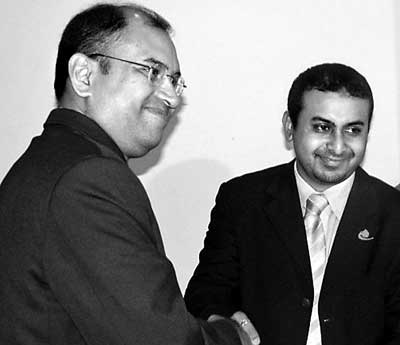
Muslim Aid’s unique micro-finance schemeHaving gained a wealth of experience in the field of international relief and development work, Muslim Aid is focusing on working in partnership with local community-based organisations. This approach has proven to be most cost-effective in poverty eradication and is also effective in building the capacity of local people to help themselves, re-gain dignity and become empowered, he said . Muslim Aid has stepped in to introduce a unique micro-finance scheme for Sri Lanka that works on the basis of charging no interest at all, in keeping with Islamic teachings, so that beneficiaries incur absolutely no costs.
It plans to create a diverse range of tested, effective and sustainable micro-finance projects in the Island which are distinctively interest-free by 2010. “We see micro-finance as an important tool in terms of helping people to escape the vicious cycle of poverty. Muslim Aid Sri Lanka (MASL) Sri Lanka Country Director Amjad Mohamed Saleem told The Sunday Times FT. Having gained a wealth of experience in the field of international relief and development work, Muslim Aid is focusing on working in partnership with local community-based organisations. This approach has proven to be most cost-effective in poverty eradication and is also effective in building the capacity of local people to help themselves, re-gain dignity and become empowered, he said . He disclosed that Amana Investments Ltd and Muslim Aid have formed a partnership to launch a microfinance scheme providing capital and training to a disadvantaged community in Colombo. The pilot project will start in Kompannyweediya making available Rs 1.5 million to more than 20 small entrepreneurs who lack the capital to expand and develop their businesses. Without collateral, most banks are unwilling to take the risk on such entrepreneurs but now through this scheme these entrepreneurs can have access to finance from Amana Investments. "This is an unique opportunity for a development agency and a financial institution to come together to lift people out of poverty and enable them to be self-reliant," said Saleem. Muslim Aid will provide basic training to beneficiaries including book-keeping, management and marketing. Beneficiaries will be chosen for their entrepreneurial skills, with recommendations from religious and reputed social institutions. The scheme will be available to people of all communities, regardless of religion or ethnicity, he said. "Through this scheme we shall provide financial assistance at affordable pricing and enable this class of entrepreneurs to improve their businesses and living standards and become bankable propositions in the future. Our alliance with Muslim Aid will add many non-financial developmental assistance to these entrepreneurs," said Faizal Salieh, Managing Director of Amana Investments. If it is successful, Amana Investments will take the scheme to the rural areas where it operates. In keeping with Islamic law, the beneficiaries will not have to pay interest or a service charge for their funds. However, a profit-sharing system will apply depending on the nature of the business. An upper limit of Rs150,000 has been placed on any individual financing. Meanwhile 25 Field officers from Muslim Aid offices in Bangladesh, Pakistan, Sri Lanka, Cambodia, Indonesia, Sudan and Somalia along with Leading scholars and academics on development and Islamic Finance from around the world met in Colombo for a consultation workshop on microfinance organized by Muslim Aid. Interest-free micro finance projects have helped to reduce the extreme poverty experienced by over 100,000 people by creating employment and livelihood programmes in Bangladesh, Somalia, Sudan, Sri Lanka and Lebanon. |
| || Front
Page | News
| Editorial
| Columns
| Sports
| Plus
| Financial
Times | International
| Mirror
| TV
Times | Funday Times|| |
| |
Copyright
2007 Wijeya
Newspapers Ltd.Colombo. Sri Lanka. |
